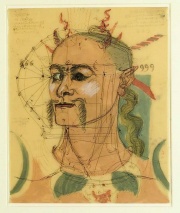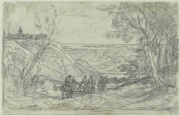Tracing paper
Description
Thin, transparent or translucent sheets manufactured for tracing original drawings. Tracing paper was historically made highly processed Linen and Cotton fibers or chemical wood pulps with added drying oils and/or natural resins. More recently, tracing paper has been made from acetate, polyester or other types of Plastic. It is sold in rolls or pads. The smooth paper accepts Ink well but also is easily stained from extraneous materials. Tracing papers have also been used as supports and linings. Some tracing papers are sold as Vegetable parchment, Imitation parchment, and Vellum paper.
Synonyms and Related Terms
Traceolene; transparent paper; papier calque (Fr.); papier à calquer (Fr.); papier à décalquer (Fr.)
Additional Information
° D.van der Reyden, C.Hofmann, M.Baker "Effects of Aging and Solvent Treatments on Some Properties of Contemporary Tracing Papers" JAIC 32:177-206, 1993. link° Amy Lubick: Tracing Paper Reference list
Sources Checked for Data in Record
- G.S.Brady, Materials Handbook, McGraw-Hill Book Co., New York, 1971 Comment: p. 576
- Ralph Mayer, A Dictionary of Art Terms and Techniques, Harper and Row Publishers, New York, 1969 (also 1945 printing)
- Matt Roberts, Don Etherington, Bookbinding and the Conservation of Books: a Dictionary of Descriptive Terminology, U.S. Government Printing Office, Washington DC, 1982
- Book and Paper Group, Paper Conservation Catalog, AIC, 1984, 1989
- The Dictionary of Paper, American Paper Institute, New York, Fourth Edition, 1980
- Art and Architecture Thesaurus Online, http://www.getty.edu/research/tools/vocabulary/aat/, J. Paul Getty Trust, Los Angeles, 2000

